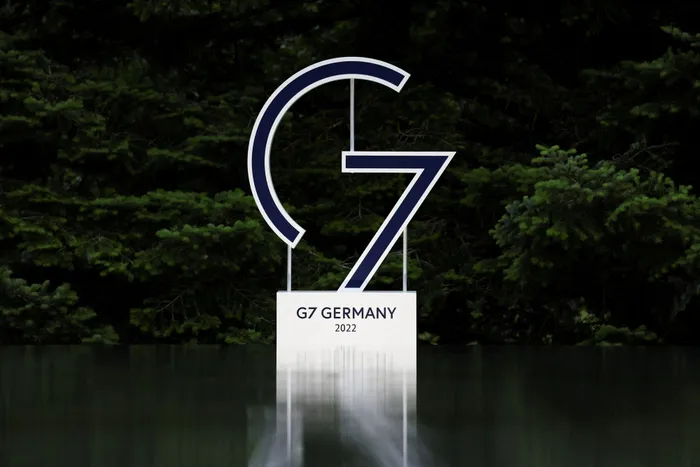BRICS claims stake of global economy, influence on G7 stage

Picture: REUTERS/Lukas Barth/Pool/File – A sign for the G7 leaders summit at Schloss Elmau castle, near Garmisch-Partenkirchen, Germany, in June 2022. As the custodians of the post-1945 global order that was marked by American dominance, the G7’s interests have not always been consistent with Africa’s interests, the writer says.
By David Monyae
The Group of 7 (G7), which is made up of seven of the world’s most developed countries including the United States, United Kingdom, Germany, Italy, France, Canada, and Japan, has become one of the world’s most influential actors.
The seven countries possess immense economic power as they produce more than 30 percent of the world’s GDP while dominating global exports and controlling critical supply chains. The Group’s members boast disproportionate influence in multilateral global platforms such as the United Nations Security Council where it has three veto-wielding members, the International Monetary Fund (IMF) and the World Bank to name a few. The G7 countries collectively control a total of 41.25 percent and 42.3 percent of the voting shares in the IMF and the World Bank.
While it was formed to specifically deal with the global oil crisis 47 years ago, the G7 later trained its attention on other global issues and became an important global policy co-ordinating forum on international security, global trade, international finance, health, and climate change among other issues. Due to its global reach, the impact of the group’s decisions and policies have an impact on Africa’s socio-economic prospects.
As the custodians of the post-1945 global order that was marked by American dominance, the G7’s interests have not always been consistent with Africa’s interests. It was at the peak of the G7’s global economic in the 1970s and 1980s when it controlled over 60 percent of the world economy that Africa was subjected to the debilitating Structural Adjustment Programmes (SAPs) by the G7-controlled IMF and the World Bank. The SAPs have been blamed for retarding Africa’s development by imposing neo-liberal policies and saddling African countries with unsustainable debt that continues to hamstring the continent’s progress today.
The IMF availed credit to African countries at significantly high interest rates based on arbitrary risk assessments which crippled African states’ ability to address poverty. Moreover, the G7-dominated WTO (World Trade Organisation) has forced African countries to open up their economies to competition from firms from industrialised which contributed to the decimation of the continent’s indigenous industries as they could hardly compete with their western counterparts.
This created unequal and neo-colonial trade structures where African countries supply raw materials while importing manufactured products locking the Continent into a dependent relationship with the West where its autonomy was undermined. Thus, in a global order effectively shaped and underwritten by the G7, Africa has been thoroughly disadvantaged and disenfranchised.
However, the global order upon which the G7’s power is based has been rapidly eroding since the turn of the twenty-first century. The new century has seen the rise of countries such as China, India, Brazil, Turkey and to a lesser extent South Africa whose share of the global economy has increased tremendously with an attendant power shift. For example, the global south equivalent of the G7, the BRICS, controls more than 25 percent of the world economy even though their per-capita incomes are still comparatively low.
These countries have wasted no time in converting their economic power into global influence aggressively courting regions such as Africa, Latin America, Asia, and the Caribbean mobilising support for an alternative global order. The BRICS has established itself as the leader of the developing world and has consistently demanded a reform of the global institutions to accommodate the interests of the global south.
With its significant voting power in global multilateral platforms and its growing market power, Africa’s voice in the future of the global order is no longer negligible. In the last few years, the G7 has increasingly realised Africa’s strategic value and has made an effort to incorporate the Continent into its agenda. This has also been motivated by the need to compete with countries such as China, which has made significant inroads in mobilising Africa behind its global agenda.
The 2021 G7 official communique stated that the group was offering Africa a new deal in terms of finance, investment, trade, and infrastructure. The Group has pledged to unveil up to US$600 billion under the Partnership for Global Infrastructure Investment (PGII) to build climate-resilient infrastructure in the developing countries which face huge infrastructure funding gaps.
Nonetheless, whether the G7 can be a trusted partner for regions such as Africa is still a moot point. The group has not demonstrated its support for the reform of global institutions such as the IMF, World Bank and the UNSC which Africa and other developing regions have consistently called for.
Their reluctance is understandable considering that these global bodies are the source of disproportionate global influence the G7 countries have enjoyed since the end of the Second World War. Moreover, the G7 countries’ hoarding of vaccines and protectionist policies on critical materials at the height of the Covid-19 pandemic showed that the group cannot be trusted to accommodate Africa’s interests in critical times. Hence, it is important that Africa goes into partnership with the G7 with its eyes wide open.
David Monyae is associate professor of Political Science & International Relations, as well as director of the Centre of Africa-China at the University of Johannesburg
This article is original to the The African. To republish, see terms and conditions.